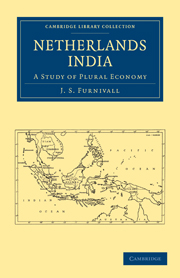Book contents
- Frontmatter
- INTRODUCTION
- Contents
- TERRITORIAL DIVISIONS
- NETHERLANDS INDIA
- AUTHOR'S PREFACE
- LIST OF GENERAL REFERENCES
- GLOSSARY
- MEASURES AND CURRENCY
- THE MALAY ARCHIPELAGO, IN COMPARISON WITH EUROPE
- Chapter I INDONESIA, TO 1600
- Chapter II THE EAST INDIA COMPANY, 1600–1800
- Chapter III THE YEARS OF CONFUSION, 1795–1815
- Chapter IV THE YEARS OF UNCERTAINTY, 1815–1830
- Chapter V THE CULTURE SYSTEM, 1830–1850
- Chapter VI THE TRANSITION TO LIBERALISM, 1850–1870
- Chapter VII LIBERALISM, 1870–190
- Chapter VIII EFFICIENCY, WELFARE AND AUTONOMY
- Chapter IX ADMINISTRATIVE AND POLITICAL REFORMS
- Chapter X ECONOMIC PROGRESS
- Chapter XI SOCIAL ECONOMY
- Chapter XII SOME EFFECTS OF THE CRISIS OF 1929
- Chapter XIII PLURAL ECONOMY
- INDEX OF REFERENCES
- GENERAL INDEX
Chapter X - ECONOMIC PROGRESS
Published online by Cambridge University Press: 07 September 2010
- Frontmatter
- INTRODUCTION
- Contents
- TERRITORIAL DIVISIONS
- NETHERLANDS INDIA
- AUTHOR'S PREFACE
- LIST OF GENERAL REFERENCES
- GLOSSARY
- MEASURES AND CURRENCY
- THE MALAY ARCHIPELAGO, IN COMPARISON WITH EUROPE
- Chapter I INDONESIA, TO 1600
- Chapter II THE EAST INDIA COMPANY, 1600–1800
- Chapter III THE YEARS OF CONFUSION, 1795–1815
- Chapter IV THE YEARS OF UNCERTAINTY, 1815–1830
- Chapter V THE CULTURE SYSTEM, 1830–1850
- Chapter VI THE TRANSITION TO LIBERALISM, 1850–1870
- Chapter VII LIBERALISM, 1870–190
- Chapter VIII EFFICIENCY, WELFARE AND AUTONOMY
- Chapter IX ADMINISTRATIVE AND POLITICAL REFORMS
- Chapter X ECONOMIC PROGRESS
- Chapter XI SOCIAL ECONOMY
- Chapter XII SOME EFFECTS OF THE CRISIS OF 1929
- Chapter XIII PLURAL ECONOMY
- INDEX OF REFERENCES
- GENERAL INDEX
Summary
1. The New Economic Constitution. In 1900, after fifty years of Liberalism, production for export was almost confined to Java, almost wholly agricultural, and almost wholly Dutch; capitalist investments in India were on a small scale and almost entirely the surplus profits of local Dutch enterprise; agricultural production had made great progress, but despite a rapid growth of planting enterprise, there was little variety of produce, and the native contribution towards agricultural production for export, except as manual labourers, was negligible; mineral development was in its infancy and industrial development was still less advanced; commerce and banking, after a brief period of prosperity, were stagnating, with the wholesale business and banking proper in European, and mainly in Dutch hands, with Chinese as middlemen and money-lenders, and with the Natives restricted to petty retail trade.
When the depression of 1900 gave the death-blow to the policy of laisser-faire the new ethical or constructive policy aimed at changing all this; at developing the Outer Provinces as well as Java, and at utilizing the resources of the State to further economic progress, not only in agriculture, but in mineral production and in industry and commerce, both directly by State enterprise, and indirectly by building up material wealth and human welfare. Van Deventer announced the theme with a triple programme of Irrigation, Emigration, Education, and Idenburg and his successors at the Colonial Office, together with Van Heutsz and subsequent Governors-General, re-echoed it in elaborate variations, gradually working out a comprehensive project of wealth and welfare by developing the soil, the forests and the mines, and encouraging agriculture, industry and commerce, and especially by promoting the advancement of the people through education, improving public health, providing credit facilities, and protecting the peasant and labourer against exploitation by the capitalist.
- Type
- Chapter
- Information
- Netherlands IndiaA Study of Plural Economy, pp. 303 - 345Publisher: Cambridge University PressPrint publication year: 2010First published in: 1939



